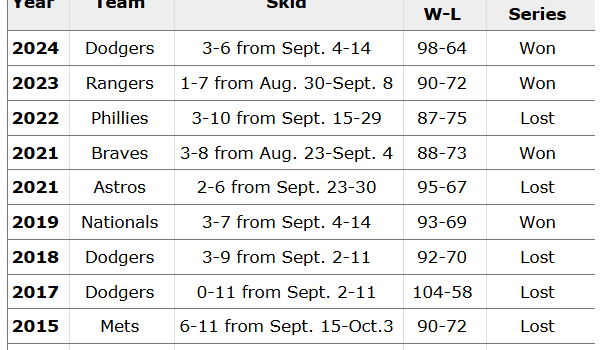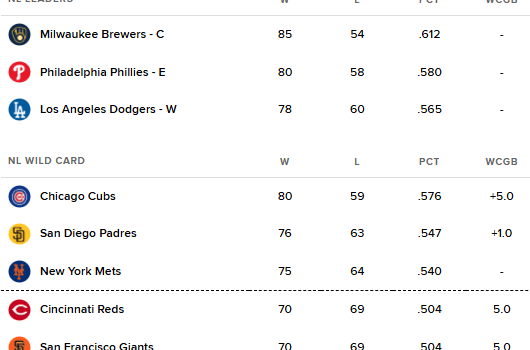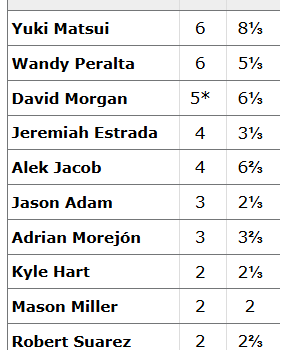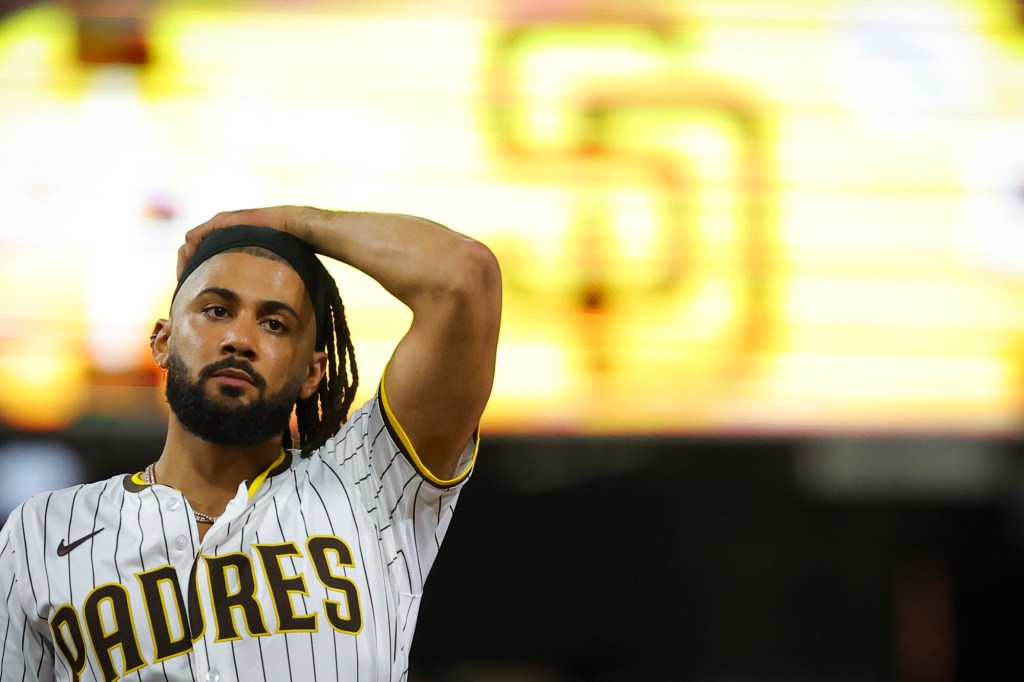Good morning,
Could this be the beginning of the end?
Sure, it could be.
If the Padres continue playing as they have for the past week-and-a-half, it almost certainly will be.
“We’re not playing good right now,” Jake Cronenworth said. “Worst stretch of the season we’ve had so far. Just not playing good.”
My game story (here) from last night’s 6-2 loss to the Orioles, the Padres’ seventh loss in nine games, explored the biggest reasons(s) behind the skid. And we will discuss that some more here later.
First, some perspective on the reality that even the best teams can look really bad near the end of a good season.
In September 2015, two teams that would meet in that year’s World Series looked nothing like two teams that would meet in that year’s World Series.
The Mets and Royals had overlapping skids, with the eventual champions going 8-16 from Sept. 4 to 29 while the Mets were 6-11 from Sept. 15 through Oct. 3.
And, in fact, 17 of the 18 World Series participants since 2015 have endured a losing stretch of at least nine games in late August and/or September that at the time almost certainly had their fanbases thinking October success was farfetched. And 12 of those 18 teams had those losing skids encompass part of the regular season’s final month.
Here are some of the noteworthy ones:

But …
The deeper issue within the Padres’ 2-7 stretch is what the biggest factor in that stretch is.
Their starting pitching has been abysmal for much of the past 2½ weeks and downright horrible the past week-and-a-half.
The Padres got five quality starts in a span of six games from Aug. 19 to 24. Those are their only quality starts in their past 18 games. (Two of those were bullpen games, including one on Sunday. That still leaves their actual starters without a quality start over their past seven games.)
The Padres are the only team in the major leagues without a quality start since Aug. 25. Their starters have a 6.30 ERA in that span, third highest in the majors. Take away reliever David Morgan’s two scoreless innings at the start of Sunday’s game in Minnesota, and that ERA would be 6.75.
There isn’t much more to dissect on this topic besides what we have been talking about every day for the past several days — other than to repeat it is a problem now and could be one later.
In the short term, the truncated starts are taxing the bullpen and putting the offense in holes that are difficult to climb out of.
My game story addressed the futility of that, as teams that give up the game’s first run lose two-thirds of the time.
And it is not just the game’s first run for the Padres lately. It is runs.
They trailed 3-0 after three innings last night. It was the 12th time in the past 15 games the Padres have trailed by multiple runs by the fourth inning.
In the playoffs, a team with a deep bullpen like the Padres can generally thrive with a starter going five (or even four) strong innings. Strong means not allowing multiple runs.
The Padres’ starters have to be better.
Will they?
The rotation certainly has the names to make that seem possible.
First off, let’s make it clear that all this talk about poor starts is excepting Nick Pivetta. He is the only Padres starter in the past eight games to last a full five innings. And that was his first time in nine starts not going at least six innings.
But there are questions about the team’s other three potential postseason starters.
Michael King has started once since May due first to his nerve impingement and then to knee inflammation. He is expected back in time to make at least four regular starts, which should be a sufficient ramp-up. But there is no way to know for sure how he will do.
The Padres have been waiting all season for Dylan Cease to get right. Talk has now turned to how to best use him in the playoffs.
And Yu Darvish is clearly not quite himself yet.
He was the culprit last night in an odd outing that lasted four innings (plus a walk to start the fifth).
Darvish got all three of his outs in the first inning via strikeout, including two of them on three pitches apiece. He also gave up a home run on an 0-2 count, hit a batter with an 0-2 pitch, hit another batter with an 0-1 pitch and walked a batter. He gave up two runs in the third, which ended when his fielders worked a relay to throw out a runner trying to take an extra base. His fourth inning ended when catcher Freddy Fermin threw out a would-be base stealer.
“Inconsistent would probably be the word,” Darvish said. “I was able to get a quick strike one, strike two, but I just … couldn’t find a pitch that I could really command and finish off hitters. So it was a bit of a struggle. … The games that I can, that I’m able to command well, I’m able to get through the game. But as of now, if I can’t find the right command, if my pitches aren’t coming out right, then I do struggle in a game.”
Here are the numbers for Cease and Darvish during this 18-game slog:

So, how worried?
The Padres’ playoff chances have dropped to 98%, according to Fangraphs.
That is down from a high of 99.6% on Saturday.
Their lead over the Mets has been trimmed to one game. And the Reds and Giants are just six games back.
Still, at this point it would take an epic collapse for the Padres to not be playing in October.
FanGraphs’ playoff projections go back to 2014. And in that time, no team that had more than a 94.1% chance of making the postseason with 29 games remaining failed to make the postseason.
The Twins last year had a 94.1% chance at this point in the season and finished as the eighth team in the American League, as they went from 75-64 and with a 5½-game cushion to 82-80 and four games out of playoff position.
Since 2014, all but four teams that had at least an 84% chance of making the playoffs with 29 games remaining have done so.
Here is the current National League playoff picture:

Iron man
Manny Machado has played every one of his team’s games this season, one of three players in the major leagues to have done so.
Among his 139 starts are 14 as the Padres’ designated hitter.
But he has not had a DH day since Aug. 18, which means he has played 14 games in 15 days at third base. That is his third-longest stretch of the season without serving as DH and his longest since mid-May.
There is no way to tell whether that has anything to do with his hitting .198 with three doubles and one home run over the past 25 games. (His .527 OPS is tied for the fifth-worst of his career over a 25-game span. The four worst all came last April and May while he was working his way back from elbow surgery.)
But Padres manager Mike Shildt has discussed the idea of a day off with the player the Padres cannot afford to be slumping much longer.
“There has been consideration,” Shildt said. “I’ve spoken to him about it. I’m going to trust a guy and, you know, there’s a possibility for that. But Manny is a guy that’s going to post and wants to post. And one thing we haven’t been able to do is get him that DH day with the way we’re configured right now and trying to keep the lineup as strong as possible and as long as possible. And that may have a bearing on it.
“I talk to him. He’ll say, ‘My day off is the day off.’ But yeah, it’s in consideration. And you know, I’m gonna continue to talk to him and weigh in on him. … I don’t think he nor I would (attribute Machado’s struggles to) anything other than the ebbs and flows of the season. But we’ll continue to monitor.”
Not the norm
Shildt believes the best offense is a good defense. Or something like that.
After Will Wagner pinch-hit for shortstop Mason McCoy and Ryan O’Hearn pinch-hit for catcher Freddy Fermin in the bottom of the seventh inning, Shildt made some changes.
O’Hearn stayed in the game to play first base while Jake Cronenworth moved from second to shortstop and Luis Arraez moved from first to second. (Elias Díaz entered the game behind the plate.)
But that is not an infield alignment Shildt seems inclined to start a game with.
“That’s when we’re down and we’re chasing it, you know?” he said. “I mean, the one thing that I can confidently say is defense is important and we don’t want to — I’ve done this long enough to see (what happens) when you’re chasing offense for the sacrifice of defense. And if you’re not on top of your game on the mound as much, you need your defense. So it’s an opportunity there to slide Croney over, get Luis to second, keep O’Hearn’s bat in the lineup, but it’s something more that we’ll see when we’re down, because we need to make sure we also field our best defense.
“Because, it’s not the sexiest thing that we talk about a lot, and we talk about the lineup construction and all the different things, but (defense) does show up. You know, there’s nine innings of defense — to catch the baseball and make outs. Outs are important. But good news is we do have some flexibility, and we’ll use it appropriately.”
Down time
A Padres reliever has come into a game to protect a lead nine times in a total of 36 appearances over the past nine games. (They have come into a tie game five times.)
So all those “down” games means the bulk of the work lately has been done by lower-leverage relievers.
Here is a look at the workload breakdown over those nine games:

Tidbits
- You can read Jeff Sanders’ story (here) for an update on Jason Adam and some thoughts from the team’s other relief pitchers.
- Arraez’s home run in the third inning was his seventh of the season, three off his career high set in 2023.
- Arraez has struck out in consecutive games for the first time this season.
- Fermin doubled twice and now has three hits (all doubles) in his past six at-bats. He was 2-for-28 leading up to this surge.
- Cronenworth walked and was hit by a pitch last night. He has a .571 on-base percentage while reaching safely in nine consecutive games.
- The move to shortstop for the final two innings was Cronenworth’s first time at the position since 2022.
- You might recognize sarcasm here, but the good thing about the Padres playing poorly is that they are taking a long time to do it. Last night’s game took three hours, five minutes, which was one minute shorter than Monday’s game. Five of the Padres’ past seven games have taken at least 2:57. Their average game time before this stretch was 2:40.
All right, that’s it for me. Early game (1:10 p.m. PT) today.
Talk to you tomorrow.
